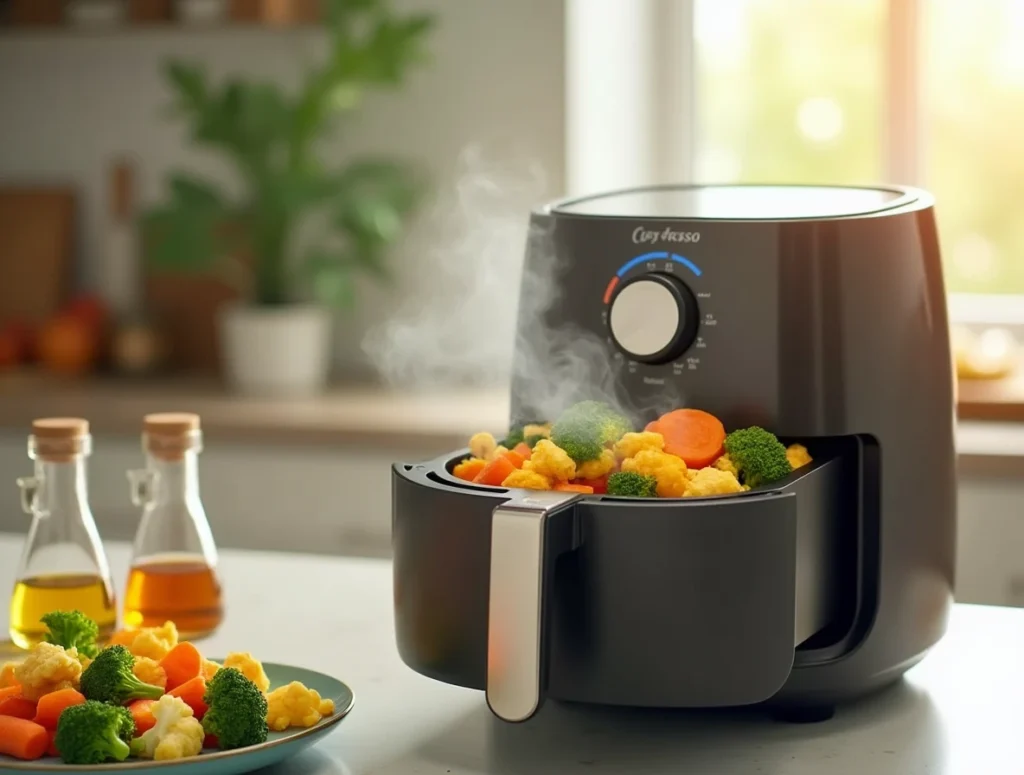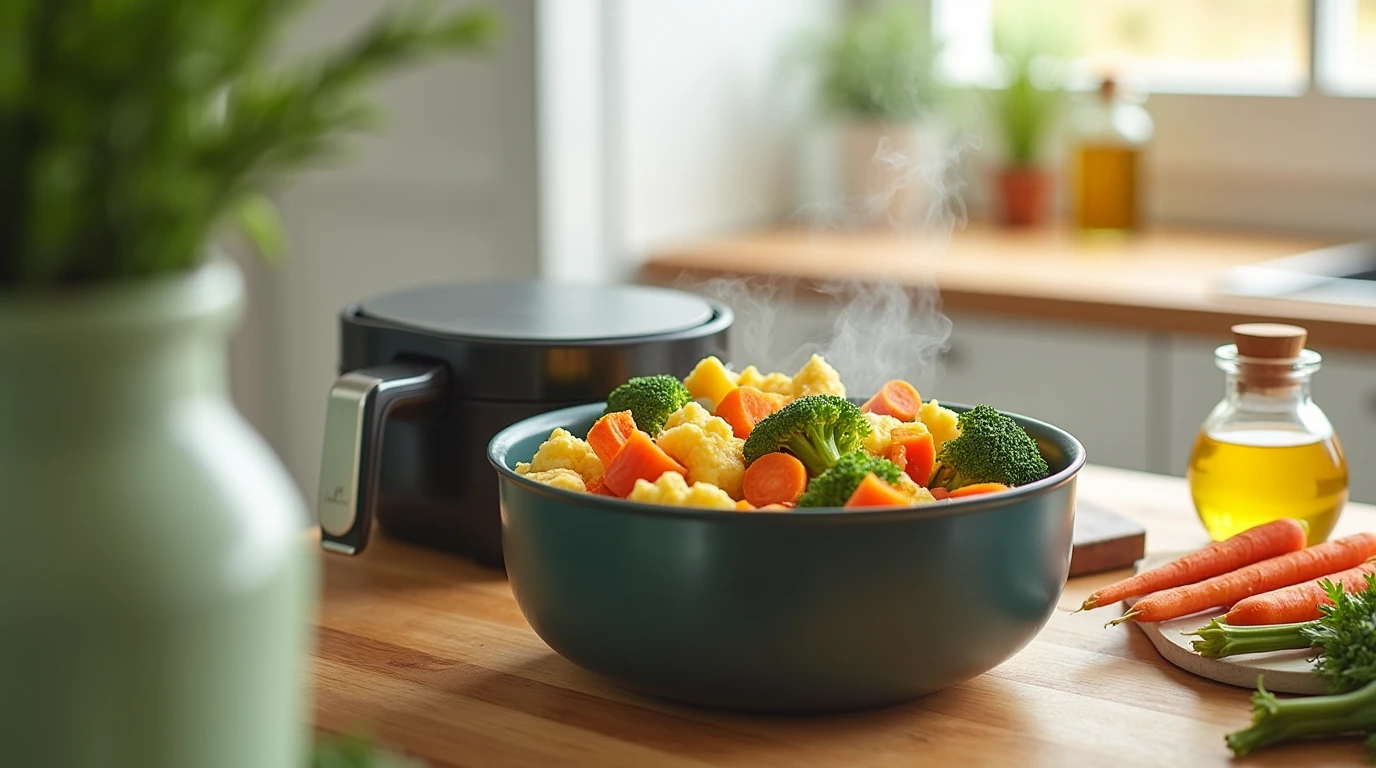Can You Put Frozen Vegetables in an Air Fryer?
Air fryers have become a staple in many kitchens, offering a quick and healthier alternative to traditional frying methods. One of the most popular uses for an air fryer is cooking frozen vegetables. But can you really just toss those frozen veggies into the air fryer, or is there more to it than meets the eye? In this article, we will explore how to cook frozen vegetables in an air fryer, the benefits, tips for best results, and answer some frequently asked questions.
Can You Put Frozen Vegetables in an Air Fryer?
Yes, you can absolutely put frozen vegetables in an air fryer, and it’s one of the easiest and healthiest ways to cook them. Air frying helps you achieve crispy and well-cooked vegetables without the need for excessive oil, making it a great alternative to traditional frying or roasting methods.
Unlike conventional ovens, an air fryer circulates hot air around the food, producing a crisp exterior while keeping the inside tender. This makes it perfect for cooking frozen vegetables that might otherwise become mushy or soggy when cooked with other methods.
Why Air Fry Frozen Vegetables?
There are several reasons why air frying frozen vegetables is a great choice:
- Faster Cooking: Air fryers can cook frozen vegetables much faster than traditional ovens, making them ideal for quick meals.
- Healthier Option: Air frying requires significantly less oil, retaining more nutrients compared to frying or roasting.
- Better Texture: Air fryers help achieve a crispy texture without the greasy finish typical of deep-fried foods.

Benefits of Cooking Frozen Vegetables in an Air Fryer
There are numerous benefits to cooking frozen vegetables in an air fryer, including:
1. Faster Cooking Time
Using an air fryer to cook frozen vegetables significantly reduces cooking time compared to traditional oven methods. With the air fryer’s efficient heat circulation, frozen veggies are often ready in 15-20 minutes, as opposed to the 30-40 minutes they may require in an oven.
2. Healthier Alternative
One of the biggest advantages of using an air fryer is the ability to cook with little to no oil. This not only cuts down on calories but also preserves the nutrients in your vegetables, keeping them healthier than deep-fried options. The air fryer can create a similar crispy texture without using much oil, making it a great choice for health-conscious individuals.
3. Maintains Texture and Flavor
The air fryer can cook frozen vegetables evenly, keeping the texture intact. Many vegetables, like broccoli or cauliflower, can become soft or soggy when boiled or steamed. However, air frying helps to retain their crispness, allowing you to enjoy both the flavor and crunch of your vegetables.
4. Minimal Clean-Up
Cooking frozen vegetables in an air fryer often results in minimal mess compared to traditional frying. The basket is easy to clean, and there’s less splatter and residue to deal with afterward.
Types of Vegetables That Can Be Air-Fried
Not all vegetables are created equal when it comes to air frying. Some freeze better than others, and certain vegetables are more suited for air frying. Below are some of the best types of vegetables for air frying:
Best Vegetables for Air Frying:
- Broccoli: It crisps up beautifully and cooks quickly in an air fryer.
- Cauliflower: Similar to broccoli, cauliflower roasts nicely and holds its texture.
- Carrots: Cut them into thin sticks, and they turn out perfectly crunchy.
- Peas: Air frying peas can bring out their natural sweetness.
- Corn: Frozen corn kernels can be air fried, making them deliciously roasted.
Vegetables That May Not Work Well:
- Leafy Greens: Vegetables like spinach and kale may not hold up well in an air fryer because they can become too crispy or even burn.
- Large Frozen Blocks: Frozen vegetables that are frozen in large chunks, such as a frozen vegetable medley, may not cook evenly in the air fryer.
For more detailed guidance on which vegetables are best for air frying, refer to this step-by-step guide.
Preparing Frozen Vegetables for the Air Fryer
One of the best things about air frying frozen vegetables is that they don’t require thawing. You can cook them straight from the freezer, saving time and effort.
Steps for Preparation:
- No Thawing Needed: Keep the vegetables frozen. Thawing them might make them soggy, which is the opposite of the crispiness you’re aiming for.
- Toss with Oil: For a light crisp, toss the vegetables in a small amount of oil. You can use olive oil, avocado oil, or even a non-stick spray for a low-calorie option.
- Season to Taste: Adding spices or herbs can enhance the flavor. Popular options include garlic powder, paprika, black pepper, or a drizzle of balsamic vinegar.
- Preheat Your Air Fryer: Preheating your air fryer ensures even cooking. This step usually takes about 3-5 minutes.
For more on how to prepare vegetables for air frying, check out this article on the best air fryer techniques here.
How to Cook Frozen Vegetables in the Air Fryer
Here’s a simple, step-by-step guide to cooking frozen vegetables in an air fryer:
- Preheat the Air Fryer: Set your air fryer to 375°F (190°C) for the best results.
- Prepare the Vegetables: Toss your frozen vegetables with oil and seasonings (if desired).
- Cook the Vegetables: Place the vegetables in the air fryer basket in a single layer. Cook for about 15-20 minutes, shaking halfway through for even cooking.
- Check for Crispiness: Once the vegetables are golden brown and crispy, remove them from the air fryer.
Different vegetables may require different cooking times, so refer to specific times for broccoli, carrots, and cauliflower as a general guide.
Achieving the Perfect Crisp
Achieving the perfect crisp in your air-fried vegetables is all about technique. Here are some tips to ensure your veggies come out crispy and delicious:
- Don’t Overcrowd: Give the vegetables room to breathe in the air fryer basket. Overcrowding can result in uneven cooking and a soggy texture.
- Shake the Basket: Shake the basket halfway through cooking to ensure even crisping.
- Use a Light Coat of Oil: Too much oil can make vegetables greasy. A light mist or toss with oil is sufficient.
Common Mistakes to Avoid When Air Frying Frozen Vegetables
To get the best results when cooking frozen vegetables in an air fryer, avoid these common mistakes:
1. Overcrowding the Basket
When you pile too many vegetables in the basket, the hot air can’t circulate properly, leading to uneven cooking. Always give your vegetables space.
2. Not Preheating the Air Fryer
Preheating helps to kickstart the cooking process and ensures even cooking from the start.
3. Using Too Much Oil
While oil can enhance crispiness, too much oil can make the vegetables greasy. Use a light mist or toss with a small amount of oil.
4. Not Shaking the Basket
Shaking the basket halfway through cooking ensures that all the vegetables cook evenly and get crispy on all sides.
How to Store Leftover Air-Fried Vegetables
If you have any leftovers, storing them is easy:
- Cool Before Storing: Let the vegetables cool to room temperature before placing them in an airtight container.
- Refrigerate: Store the leftovers in the fridge for up to 2-3 days.
- Reheat: To reheat, simply toss the vegetables back into the air fryer for a few minutes to crisp them up again.
FAQs
How Long Does It Take to Cook Frozen Vegetables in an Air Fryer?
The cooking time for frozen vegetables in an air fryer generally ranges between 15 to 20 minutes. However, the exact time depends on the type of vegetable, its size, and how crispy you like it. Smaller vegetables, like peas or corn, may take less time (around 10-12 minutes), while larger vegetables like broccoli or cauliflower may need 15-20 minutes. For best results, always check the texture and crispiness at the 15-minute mark and adjust as needed.
If you’re cooking larger or thicker frozen vegetables, you may need to add a few extra minutes to ensure they’re cooked through. For instance, carrots or potatoes might need about 20-25 minutes, while softer veggies like spinach may require much less time. The beauty of air frying is that it’s fast, but the key is to check the vegetables as they cook to ensure they don’t overcook or burn.
What Temperature Should You Cook Frozen Vegetables in an Air Fryer?
For most frozen vegetables, a temperature of 375°F to 400°F works best. This high heat allows the vegetables to cook quickly, ensuring a crispy texture on the outside while keeping the interior tender. A temperature of 375°F is typically ideal for softer vegetables like peas or green beans, while 400°F is great for denser, thicker vegetables like carrots or Brussels sprouts. Make sure to preheat your air fryer for 3-5 minutes before adding the vegetables to ensure even cooking.
Why Do My Frozen Vegetables Come Out Soggy in the Air Fryer?
Soggy frozen vegetables are often the result of one of a few common mistakes:
- Overcrowding the Basket: If the vegetables are packed too tightly, the hot air can’t circulate around them properly, leading to uneven cooking and sogginess.
- Too Much Oil: While a small amount of oil helps with crispiness, using too much can result in greasy, soggy vegetables.
- Excess Moisture: Frozen vegetables often release moisture as they cook. If the vegetables aren’t properly dried or if excess moisture is trapped in the basket, they may become soggy.
To avoid these issues, always spread the vegetables in a single layer, use a light mist of oil, and shake the basket halfway through cooking to allow for even crisping.
Can You Cook Frozen Mixed Vegetables in the Air Fryer?
Yes, you can absolutely cook frozen mixed vegetables in the air fryer! The process is similar to cooking individual vegetables. The key to getting the best results is to ensure that the mixed vegetables are spread out evenly in the basket. Overcrowding can lead to uneven cooking and some vegetables being undercooked while others may burn. To get the crispiness you desire, shake the basket halfway through cooking to allow all the vegetables to cook uniformly. Additionally, be sure to check the specific vegetables in your mix as some may cook faster than others.
Conclusion
Air frying frozen vegetables is not only a convenient and time-saving cooking method, but it also offers numerous health benefits. Unlike traditional frying, which requires excessive oil, air frying allows you to achieve that perfect crispy texture with little to no added fat. This means you can enjoy your favorite vegetables without the guilt, making it an ideal option for those seeking a healthier lifestyle.
The beauty of using an air fryer for frozen vegetables lies in its ability to cook quickly and evenly. Thanks to the rapid circulation of hot air, vegetables cook faster than in a conventional oven, cutting down on prep time while retaining more of their nutrients. Whether you’re cooking broccoli, carrots, cauliflower, or even peas, the air fryer ensures that each vegetable is evenly crisped on the outside while maintaining a tender, flavorful interior.
One of the key benefits of air frying frozen vegetables is its versatility. You can experiment with different seasoning blends to enhance the flavor and customize the taste to suit your preferences. So, if you’re looking for a fast, nutritious side dish, the air fryer is your go-to kitchen appliance. Just toss those frozen vegetables in, and in no time, you’ll have a crispy, golden snack or side dish that’s both healthy and satisfying.

